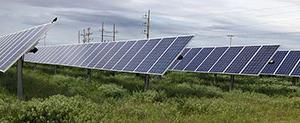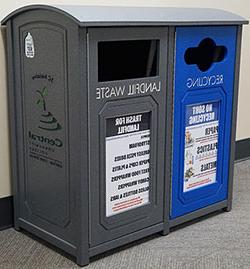Environmental Sustainability Action Plan (ESAP)
We hope you join Central Community College’s 3C Initiative, our collective efforts across the college to foster positive change and educate for a sustainable environment for everyone. Below you can learn about the college’s Environmental Sustainability Action Plan – our commitment, goals and actions in education, energy, waste, procurement, for our campuses and centers, and more – and what we are doing now to make a difference.
Central Community College’s Environmental Sustainability Action Plan (ESAP) spells out our commitment, goals and actions CCC is taking to be a great steward of our environment – for our students, community and the planet.
Explore CCC’s areas of impact and our visionary environmental stewardship commitment and leadership goals below.

Figures required to calculate the percentage of courses offered by the institution that are sustainability course offerings:
| Undergraduate | Graduate | |
| Total number of courses offered by the institution | 910 | 0 |
| Number of sustainability courses offered | 29 | 0 |
| Number of courses offered that include sustainability | 49 | 0 |
Percentage of courses that are sustainability course offerings: 8.57
Faculty self-identify and the courses are verified by the Environmental Sustainability Across the Curriculum (ESATC) college-wide committee, which is co-chaired by faculty and the environmental sustainability director. We also have a rubric as identified by STARS resources.
e-Badge
 An e-Badge is an award that demonstrates a student’s knowledge and skills in environmental stewardship for either their field of study or personal application. e-Badge opportunities at CCC are for all fields of study and for all learners and are earned by demonstrating proficiencies in both knowledge and applied skills. For CCC students, earned e-Badges also appear on their co-curricular transcript and all learners can post the e-Badge award on their resumes and social media networks, which appeal to potential employers. The combination of e-Badge proficiencies creates opportunities for learners to become change-agents for an environmentally sustainable future and can give earners a competitive edge in their field of study. CCC students, employees and those outside the college can choose among multiple options, including credit courses, community education courses and other experiences.
An e-Badge is an award that demonstrates a student’s knowledge and skills in environmental stewardship for either their field of study or personal application. e-Badge opportunities at CCC are for all fields of study and for all learners and are earned by demonstrating proficiencies in both knowledge and applied skills. For CCC students, earned e-Badges also appear on their co-curricular transcript and all learners can post the e-Badge award on their resumes and social media networks, which appeal to potential employers. The combination of e-Badge proficiencies creates opportunities for learners to become change-agents for an environmentally sustainable future and can give earners a competitive edge in their field of study. CCC students, employees and those outside the college can choose among multiple options, including credit courses, community education courses and other experiences.
The e-Badge launched in 2016 with six pilot courses. Students can build their resume, advance their knowledge and skills and showcase your accomplishments by earning any of 4 CCC eBadges: Leadership in Environmental Stewardship, Symbiosis, or Problem Solving and Community Involvement. Currently, 147 students are registered and 35 students have completed e-Badge requirements.
Sustainability Leadership Presentation Series (SLPS)

SLPS is a collaborative live broadcast of highly qualified speakers, presenting on regional topics of sustainability and global and local environmental issues. The SLPS stimulates needed discussion and provides examples for action, planning and problem solving for leadership in environmental sustainability.
The SLPS is a partnership between Central Community College, Creighton University Office of Sustainability Programs, Hastings College Student Environmental Action Coalition, Joslyn Institute for Sustainable Communities, Metropolitan Community College, Nebraska Recycling Council, University of Nebraska-Lincoln Environmental Studies and University of Nebraska at Omaha’s Office of Sustainability.
Presentations for the 2022-23 season included:
- Compost Corner: The State of Composting in Nebraska presented by Brent Crampton, Director of Partnerships for Hillside Solutions; Haley Nolde, Executive Director for Nebraska Recycling Council; and Jean Waters, a Sustainability Consultant.
- Seeking Sustainability: How Consumer Demand is Changing Business presented by Jeff Jirovec, Owner & Operator for Grow with the Flow; Leigh Neary, Owner & Founder for Exist Green; and Jackson MacLean, Territory Manager for Casella Waste Solutions.
- Growing Net Metering Opportunities presented by Jeff Berggren, Territory Sales Manager for Valmont; Tim Chancellor, Finishing Supervisor for Thomas Livestock; and Michael Shonka, President for Solar Heat and Electric
- Central Nebraska Regenerative Agriculture Conference presented by Gabe Brown, farmer, rancher, and author of "Dirt to Soil: One Family's Journey into Regenerative Agriculture".
- Biochar: Multi-Purpose Helping to Mitigate Climate Change presented by Michael Kaiser, assistant professor at University of Nebraska at Lincoln; Nash Leef, Environmental Scientist for the City of Lincoln; and Jeff Fischer, senior project manager at NNPD
Training
- Since 2013, CCC’s environmental sustainability office has hired interns to promote environmental sustainability efforts across its multiple college locations. Interns learn more about the environmental sustainability field and gain professional job skills.
- Between 2013 and 2017, the 3C Conversation was hosted at all CCC locations, where students discussed environmental sustainability topics. Students also had the opportunity to learn about new topics, discuss them and ask questions. The 3C conversation led to the creation of a student sustainability club in fall 2018.
- CCC’s environmental sustainability office helps support and promote extended learning services’ community education courses and summer camps that educate around sustainability topics.
Current Goals
Annually – Increase environmental stewardship e-Badges awarded by 5 percent annually based on previous year eBadge completers for the next five years.
2024 – Increase courses, including sustainable development goals (SDGs), annually by five percent.
2024 – Develop key partnerships with energy technology industry offering potential internships.
Fall 2025 – Articulate BIO 1040, introduction to sustainability, as a general education course to other Nebraska higher education institutions.
Fall 2025 – Start a sustainability certificate program.
As a member of Second Nature’s Climate Leadership Network, Central Community College is dedicated to reducing its greenhouse gas emissions. Strategies include reducing energy consumption, improving energy efficiency and investing in clean and renewable energy sources.
In 2013, CCC completed its first greenhouse gas inventory, which helped in developing strategies for reducing emissions and made it possible to track the progress. The 2013 inventory is used as the college’s baseline.
Achievements to date:
- CCC began purchasing hybrid electric fleet vehicles in 2012. As of 2018, 34 percent of the college’s fleet vehicles were gasoline-electric, non-plug-in hybrid vehicles.
- In 2012, a 3.7 kW Skystream wind turbine and a 17-kW solar array were added on the Hastings Campus. These systems are used for educational purposes in the campus’ mechatronics program and provide electricity to the Merrick building on campus.
 In 2016, a 1.7 MW wind turbine was built on the Hastings campus through a partnership with Bluestem Energy Solutions, Hastings Utilities and CCC. The wind turbine produces enough electricity annually to power the campus and any excess electricity flows into the Hastings Utilities grid.
In 2016, a 1.7 MW wind turbine was built on the Hastings campus through a partnership with Bluestem Energy Solutions, Hastings Utilities and CCC. The wind turbine produces enough electricity annually to power the campus and any excess electricity flows into the Hastings Utilities grid.- In 2017, a new Kearney Center (right) was built to LEED Silver standards with numerous energy-saving features. These features include daylighting in the hallways and classrooms, energy efficient lighting, Solatubes in two classrooms and one lab, SageGlass on east facing windows and a geothermal energy system.
 In 2018, CCC purchased 350 solar energy shares in the Kearney Community Solar Project. Each share is equal to 150 kWh/month, which equals 100 percent of the average monthly electricity usage at the Kearney Center. CCC locks in a rate with a purchase power agreement between Nebraska Public Power District and solar developer SoCore Energy.
In 2018, CCC purchased 350 solar energy shares in the Kearney Community Solar Project. Each share is equal to 150 kWh/month, which equals 100 percent of the average monthly electricity usage at the Kearney Center. CCC locks in a rate with a purchase power agreement between Nebraska Public Power District and solar developer SoCore Energy.
The Kearney Center received the first GreenPower certificate associated with the Kearney Community Solar Project. CCC retains the environmental attributes associated with the purchased carbon free energy shares.- CCC has improved the ability for its employees to videoconference, thus reducing the need to travel to meet in person.
- From the 2013 baseline, CCC has reduced Scope 1 (on-campus) emissions by 27.21 percent, Scope 2 (purchased electricity) emissions from by 42.39 percent, Scope 3 (indirect) emissions by 39.76 percent and overall emissions by 39.25 percent.
- In 2019, CCC conducted a commuting survey to gather data on how far students, faculty and staff travel to campus as well as what modes of transportation they use. Since the last survey in 2012, the rates of single passenger use for students and employees have increased by about one percent. Other modes of transportation include carpool, walking, biking and public busses. The length of automobile trips increased by about five miles for students and four miles for faculty. The length of trips decreased by about one mile for staff.
Current goals:
2025 – Decrease student and employee commuter travel by 25 percent from the 2012-13 baseline on all campuses through an intracity public transportation and a commuter program.
2025 – Increase electric fleet vehicle usage of charging stations on each campus and the Kearney Center by 25 percent.
2025 – Each campus will be carbon neutral in electricity use on campus through local renewable energy projects and power purchase agreements.
Central Community College understands the importance of taking steps to reduce its carbon footprint and protect natural resources through recycling and implementing other policies that will reduce the amount of waste sent to the landfill. The goal is to develop a culture of mindful students and staff that collaborate to conserve resources through reusing supplies and reducing waste. From the use of post-consumer recycled paper, to the expanding its compost project college wide, CCC envisions a college wide transformation on waste reduction.
Achievements to date:
- CCC is working to annually increase FSC-certified and post-consumer waste content of paper by 10 percent, by monitoring the paper purchased across the institution.
 In 2012, single stream recycling was implemented throughout the college by installing recycle bins in the hallways and at individual desks. CCC’s campuses collect e-waste separately, calling a pick-up service when they have a combined five pallets worth. When contracting for construction, CCC requires contractors to submit a monthly sustainability report to ensure compliance to recycling and other sustainability policies. The largest waste streams on the campus are paper, plastic drink containers and cardboard.
In 2012, single stream recycling was implemented throughout the college by installing recycle bins in the hallways and at individual desks. CCC’s campuses collect e-waste separately, calling a pick-up service when they have a combined five pallets worth. When contracting for construction, CCC requires contractors to submit a monthly sustainability report to ensure compliance to recycling and other sustainability policies. The largest waste streams on the campus are paper, plastic drink containers and cardboard. - Since the recycling program started, the diversion rates for the Columbus campus (assuming all containers are 80 percent full) is about 32 percent. The Hastings campus has had a 20 percent diversion rate, considering that the landfill and cardboard-only containers average 75 percent full on a weekly basis and the recycling compactor has an average of 1,500 pounds per month. The Grand Island campus has a diversion rate of 19 percent. However, this did not include plastic film recycling and the scrap metal recycled from the electrical lab.
- In May 2017, CCC installed new printers at all of its locations to reduce energy and paper consumption. In 2020, CCC decreased its paper usage by forty-six percent in comparison to the 2015-16 fiscal year. In 2016, CCC’s employees eliminated personal/office printers as a part of a policy to reduce paper consumption.
 In 2016, the hospitality management and culinary arts program on the Hastings Campus implemented a compost program utilizing two tumbling composter bins. It is estimated that about eight gallons of composted material is produced per week. In 2017, a small composter was purchased to further reduce the amount of food waste in the landfill. The equipment was also purchased for the Grand Island campus and Kearney Center. The composters currently serve faculty and staff rooms and have diverted approximately 300 pounds of organic waste from the landfill over a six-month period. This project is still in its initial phase and it will expand to serve the students in the future.
In 2016, the hospitality management and culinary arts program on the Hastings Campus implemented a compost program utilizing two tumbling composter bins. It is estimated that about eight gallons of composted material is produced per week. In 2017, a small composter was purchased to further reduce the amount of food waste in the landfill. The equipment was also purchased for the Grand Island campus and Kearney Center. The composters currently serve faculty and staff rooms and have diverted approximately 300 pounds of organic waste from the landfill over a six-month period. This project is still in its initial phase and it will expand to serve the students in the future.- CCC’s dining operator, Chartwells, encourages the use of reusable containers with a discount program tailored to benefit those who bring their own food container.
- November 2017, CCC’s three campus locations and the Kearney Center started the Trex Plastic Bag Kickoff Recycling challenge. The goal was to collect 500 pounds of plastic bags. In 2019, Central Community College was awarded a Trex bench made out of the collected plastic grocery bags, plastic film and wood fiber; the bench was added to the Columbus pollinator garden.
- In 2013, Central Community College became member of the Nebraska Recycling Council, formerly WasteCap Nebraska. This partnership has resulted in access to programs, resources and a network of people in businesses, nonprofits, schools and communities across Nebraska working to maximize the economic and environmental benefits of materials management. CCC received the organization’s 2016 Green Team of the Year Award. The award is presented to a business or community that has excelled at resource recovery and recycling.
Current goals:
Annually increase FSC-certified and post-consumer waste content of paper by 10 percent from 2019-2020 baseline.
2024 – Divert a minimum of 40 percent of college landfill and construction waste for recycle and reuse.
2024 – Track our food service provider and employee composting program diversion rates.
2024 – Decrease college paper use to achieve a 25 percent reduction from the 2015-16 baseline.
A college campus is more than a collection of buildings, parking lots and green spaces; it supports intellectual and social interactions among the people within those spaces. Because of this, the campus landscape should include outdoor use areas that encourage the campus community – students, faculty and staff – to engage with the natural environment and with each other. These outdoor spaces, and the experiences they offer, help to support the learning process, giving the campus its sense of place.
The Grand Island Campus sustainable landscape master plan was completed from 2013-2015. Implementing the master plan will improve the health of land, water, and everyone on campus. The plan recommends improving soil characteristics, protecting soils during construction, and changing plant species and maintenance practices to improve land health. These actions will improve the ability of soils to absorb and release moisture and support increased micronutrient uptake in plants.
Better matching vegetation to local soil types, regional conditions, and on-going climate change will result in less time and money spent irrigating and frequently mowing large areas of the campus.
Primary beneficiaries of improved land and water health on campus are its staff and students. They will benefit from the reduced use of chemicals and air pollution associated with landscape maintenance. A visually, more diverse campus landscape, served by an interconnected system of walking trails, will encourage people to spend more time outdoors – experiencing the benefits of active lifestyles while being exposed to reduced levels of herbicides and pesticides.
Pollinator Habitats
CCC recognizes the important role that pollinators play in our lives. Since 2017, CCC has increased the number of native plants across its campuses and centers through the installation of pollinator gardens on all three campuses. Two of the gardens, Columbus and Grand Island (pictured below), were made possible through a grant from the Nebraska Statewide Arboretum.
The pollinator plants are native to Nebraska, making them hardy, low-maintenance and able to endure brisk winters and stifling summers. The plants bloom throughout three seasons to attract pollinator insects.
- The pollinator garden at the Columbus Campus is approximately 7,200 square feet and has about 1,460 flowers, grasses, shrubs, and nesting boxes. The garden is utilized as a learning lab for community education, environmental sustainability, agriculture and entomology.
- In October 2017, the CCC Grand Island Campus 6,000-square-foot pollinator garden was completed. The project involved interdisciplinary collaboration from the campus green team consisting of administration, grants, facilities, extended learning services, and faculty. The pollinator garden was planted with more than 25 different types of native flowers, perennials, and deciduous shrubs that provide nectar and pollen for a wide range of pollinators, including monarch butterflies, bees, moths, birds and many more. Diverse plants were selected to survive the wind, cold, and drought and to provide food and shelter resources for pollinators in three seasons.
The garden does more than just feed pollinators, it ensures an ecologically-friendly habitat that supports their health and safety through water-wise practices, soil health and sustainable landscape management. A winding crushed stone path and a northwind switch grass protective berm provide an outdoor walking space for students, staff, and faculty. The garden serves as an educational opportunity, where students have the chance to enhance their knowledge through hands-on projects and earn e-Badge proficiencies. - The CCC Kearney Center’s native plants will increase the mosaic of ecosystem benefits of Central Nebraska’s pollinators and plant habitats, which have become fragmented due to large-scale agricultural land use. The native grasses and wildflowers will take 2–3 years to become fully established and eventually will need to be burned to provide a natural prairie ecosystem. The Nebraska regionally hardy native plant palette are low-maintenance, able to endure cold and windy winters as well as hot and humid summers and bloom throughout three seasons to attract pollinator insects.
- The Hastings HMRM program received a CCC mini-grant for a pollinator garden and planted it in summer 2017. The garden is located on the east side of the Dawson Building. It is near the HMRM vegetable garden, which will in turn benefit from the pollinators.
- Since 2014, CCC's Extended Learning Services has offered a beekeeping course on the Grand Island campus. The yearlong Beginning Beekeeping course meets once a month and introduces students to the honeybee and its environment.
- In 2015, beehives were added to the Grand Island campus. These hives enhance the hands-on experience of the beekeeping course and the pollinator garden.
- In 2017, two beehives were added to the Hastings Campus to further enhance the educational experience with pollinators.
- In 2017, CCC-Grand Island was named a Bee Campus USA, becoming the 29th institution in the United States to designated and is currently the only one in Nebraska.
The Bee Campus USA program endorses a set of commitments, defined in reporting, for creating sustainable habitats for pollinators, which are vital to feeding the planet. One in every three bites of food we eat is courtesy of insect pollination. Equally important, 90 percent of all wild plants and trees rely on pollinators for the survival of their species. Pollinators are facing global declines due to loss of habitat essential for food and shelter, diseases and parasites, and inappropriate pesticide use. Bee Campuses work to protect pollinators by raising awareness, enhancing pollinator habitats, and celebrating achievements. - CCC participates in Monarch Watch to contribute to research efforts in order to track monarch numbers by tagging both wild and raised specimens for release. Monarchs are some of the most widely recognizable butterflies in the United States because of their aesthetics and jaw-dropping migrations.
- Through Monarch Watch, butterflies are tagged using a small sticker upon capture or emergence. The sticker is placed on the lower, hind, discal cell and does not harm the butterfly or impede flight. Data is collected, recorded and the butterflies are released. Each sticker is printed with a unique serial number.
Additional Gardens
In 2018, the Pawnee Nation and CCC-Hastings explored new territory by holding the first meeting on indigenous crops in Nebraska. CCC’s partners for the event were Pawnee Nation College, Oklahoma State University and the University of Nebraska-Lincoln. It drew more than 50 Pawnee Nation members to Hastings, including three of the eight Pawnee chiefs, Pawnee Nation College students, and members of the Omaha Nation of Nebraska and other tribal nations from around the U.S.
- In 2017, with the help of Deb-Echo Hawk, Ronnie O’Brien, Pawnee and CCC interns, a crop of sacred Pawnee Corn was grown on the Hastings campus. This ‘sprouted’ the idea of the annual Hastings Earth Day event to be focused on native corn and zero waste (more information can be found in the campus events section).
- The CCC-Kearney Center has five bioretention gardens that help capture and treat storm water runoff before being released into on-site detention basins. The sediment traps help to collect silt/sediment at inflow pipes into basins. Although there are no current municipal requirements for water quality treatment, the bioretention gardens were sized to provide the water quality volume for 80 percent of the building site.
Current Goals
Annually – Use food waste compost in grounds, culinary, native, and pollinator campus gardens.
Annually – Reduce overall pesticide and fertilizer use on each campus through compost and natural pesticides.
2024 – Establish edible landscapes and local food production on each campus to provide 10 percent of the overall produce used by on campus food service vendors and the culinary program.
2025 – Document all native plant species in all pollinator gardens and add maps to the webpage.
2025 – Decrease water usage on all campuses by 10 percent.
Central Community College strives to create strong relationships between the college and the different communities it serves. Through community service and the promotion of health projects, CCC has established partnerships with organizations such as local community agencies in the communities of Columbus, Grand Island, and Kearney, as well as the Nebraska State Fair. As part of CCC’s responsibility to care for the health and wellbeing of all, multiple projects and initiatives are targeted to help communities become more walkable and bikable. CCC envisions the opportunity to volunteer in many other community service projects as well as develop a culture of walking and biking in every community it serves.
Achievements to Date:
- In 2015, Central Community College became a sponsor of the Nebraska State Fair Bike Barn. This project has been a collaboration between the Nebraska State Fair, the Chamber of Commerce in Grand Island and CCC to promote the many benefits of bicycling. Cyclists have the opportunity to win a prize for showing support for the bike barn, bike safety, personal and community health and wellness, as well as their concern for environmental sustainability.
- Since 2016, CCC has celebrated Earth Day with multiple events including an annual wellness walk. CCC staff and students are encouraged to participate in the 30-minute walk around campus.
- In partnership with the Grand Island Clean Community System, the environmental sustainability office has hosted a semi-annual highway litter clean up since 2016. Each year students and staff volunteer their time to pick up litter from the sides of one of the highways in Grand Island.
- In 2017, CCC and the Central District Health Department collaborated to install a public bike fix-it station. The station includes all the tools necessary to perform basic bike repairs and maintenance, from changing a flat tire to adjusting brakes and derailleurs.
- Since 2017, CCC has participated in a local Kearney group called Move Kearney that is working to improve the walkability and bikability of the community. The committee is facilitated by Two Rivers Public Health Department and consists of local community members.
- In 2015, CCC implemented a bike share program on the Grand Island campus for students and employees to use free of charge with funding support from Blue Cross Blue Shield of Nebraska. The next year, the program was expanded to the Columbus campus. As one of the first bike share programs in our communities and at a rural community college, CCC is leading the way for an environmentally sustainable and healthy society.
The bike share program consists of 10 bikes owned by Central Community College. In 2017, a mobile version of the program was launched to better serve bike share patrons. The Movatic app allows the users of the bike share program to check a bike in or out with a smartphone. - On June 24, 2017, Central Community College collaborated with the City of Grand Island on the Walk with the Mayor event that promotes active living. Community members gathered at a local park to walk with the Mayor as well as to learn about the different trails around the city. CCC embraced this opportunity to establish community partnerships and share information about the benefits that walking and biking have for the environment.
Current Goals:
Annually – The environmental sustainability office volunteers in a minimum of three community service and health projects.
Annually – Organize a bike/walk/outdoor event on each campus.
Fall 2024 – Promote a bike ride on each campus and on community trails.
Fall 2024 – Promote trail usage in all communities.
2026 – Have trails connecting each campus to the local community.
Central Community College hosts campus events and collaborates with community partners to share resources and information that promote sustainable practices. Events include Earth Month, the Nebraska State Fair Sustainability Pavilion, America Recycles Day, CCC’s Pollinator Festival, and a campus-community resilience committee.
Achievements to Date:
- Since 2017, CCC’s environmental sustainability office has hosted events across its locations throughout the month of April to celebrate Earth Day. These events allow local organizations to connect with CCC students and employees and for students to showcase their sustainability projects. A variety of presentations and tours give students, employees and community members the opportunity to learn about sustainability-related topics including renewable energy, waste reduction, ecology, agriculture, and research.
- Since 2016, CCC has celebrated America Recycles Day on November 15 at the Columbus Campus. The event hosts representatives from local organizations including Nebraska Recycling Council, Green Fiber, ADM, Keep Columbus Beautiful and Shred Monster. Student projects from the Columbus campus environmental science class are also displayed. Attendees learn about proper recycling, how to reduce waste contamination and have the opportunity to sign a recycling pledge.
- The Hastings campus Earth Day event was hosted in conjunction with CCC’s environmental sustainability office and the hospitality management and culinary arts department. This event has focused on growing and preparing food sustainably and also celebrates the Pawnee Tribe and its history in Nebraska.The 2019 Sustainable Nebraska: Then and Now event compared how the Pawnee nation and pioneers lived before modern conveniences with how we live now. Five different stations represented a part of everyday living: nutrition, clothing, shelter, gardening and energy technology. The event had presenters from the Pawnee Nation College and pioneer reenactors to help demonstrate with actual hands-on visuals and activities to represent each station.
- Since 2016, CCC’s environmental sustainability office has hosted presentations and student projects at the Nebraska State Fair Sustainability Pavilion. The presentations and projects have included information on pollinators, sustainable agriculture, sustainable building materials, vermicomposting, and waste reduction.
- In 2017, CCC’s Environmental Sustainability Office participated in the Nebraska Summer Transportation Academy hosted by CCC’s Extended Learning Services. This camp is for students entering ninth-12th grade and focuses on transportation. Students learned about geographic information systems (GIS) and made solar racecars from a kit. Students then raced battery and solar cars.
- In October 2018, CCC hosted its inaugural Pollinator Festival on the Grand Island campus. The event is a partnership between CCC’s extended learning services and the environmental sustainability office. The event featured live music, beekeeping demonstrations, tours of the campus’s pollinator garden and activities for both children and adults. Speakers and vendors shared information about pollinators and the plants that support them.Featured speakers included Pete Berthelson, Conservation Blueprint LLC; Dr. Doug Golick, associate professor of entomology at the University of Nebraska-Lincoln; Elizabeth Killinger, master gardener; Brian Nilson, Nebraska Beekeepers Association; Rae Powers, Xerces Society; and Carol Wienhold, Nebraska Department of Roads.
- As a signatory of Second Nature’s Climate Commitment, CCC must complete an annual greenhouse gas inventory, develop a climate action plan and facilitate a resilience committee. In 2018, all CCC campuses and the Kearney Center initiated resilience committees in each community.Second Nature defines resilience as the ability of a system or community to survive disruption and to anticipate, adapt, and flourish in the face of change. Resilience incorporates both short-term and long-term trends, and being able to thrive and adapt.Initial meetings focus on completing a campus-community resilience assessment, which identifies strengths and vulnerabilities on campus and in the local community across five dimensions of resilience:
Social Equity and Governance
- Few climate change education options
- Income disparity between populations
Health and Wellness
- Little access to mental health services
- Poor nutritional food choices despite availability
- Few affordable housing options based on standard of living
Ecosystem Services
- Access to outdoor recreation
- Emphasis on monoculture commodity agriculture crops resulting in lack of biodiversity
- Pesticide and fertilizer contamination affect water quality
Infrastructure
- Limited alternative transportation options
- Communication/emergency planning in place, but only in one language
Economic
- Economy is focused on agriculture
- Very few tax incentives for renewable energy/energy efficiency upgrades
- Citizens with higher education often leave area for other job opportunities
Current Goals:
Annually – Plan America Recycles Day, Earth Month, pollinator festival, and other sustainability and community events in partnership with faculty, various on-campus departments/staff, local businesses and nonprofits.
Annually – Participate in three presentations at local community events or in media outlets.
Annually – Participate in three local community sustainability groups/committees and volunteer at shared planned local events.
Fall 2024 – List community events the Students 4 Sustainability club and office has volunteered for.
Fall 2024 – Provide descriptions of all events the sustainability office and the S4S club participated in.
Contact:
Benjamin Newton
Environmental Sustainability Director
benjaminnewton@thebetterlife.net
308-398-7962





